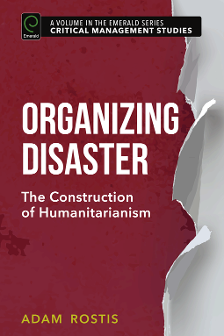
Foreword
ISBN: 978-1-78560-685-4, eISBN: 978-1-78560-684-7
ISSN: 2059-6561
Publication date: 8 March 2016
Citation
(2016), "Foreword", Organizing Disaster (Critical Management Studies), Emerald Group Publishing Limited, Leeds, pp. ix-x. https://doi.org/10.1108/S2059-65612016012
Publisher
:Emerald Group Publishing Limited
Copyright © 2016 Emerald Group Publishing Limited
When I was approached by Emerald to be the editor of the Critical Management Studies (CMS) series I readily accepted. That was the easy part. The hard part was in defining/deciding what kind of work should be included under that umbrella term. It had to be broad enough to include a range of progressive work from different radical traditions but not too broad as to be indistinguishable from accounts aimed at reconciling capitalism with a broad range of social concerns, for example, conscious capitalism. To that end, if a line has to be drawn it is between scholarly contibutions that, at best, seek improvement in the status quo and those that encourage us to rethink the fundamental relationships between working/organizing/managing and our sense of humanity. In privileging the later, inspiration is drawn from a range of radical traditions that include feminism, critical theory, Marxism, postmodernism/poststructuralism, critical race theory, environmentalism, labor process theory, postcolonial theory, existentialism, applied critical management studies, and many other radical contributions that may or may not identify with the CMS umbrella term. In other words, we are looking for a range of contributions aimed at far-reaching socio-political change from those who self-identify as CMS scholars, critical scholars of management, or no particular identity project.
Adam Rostis’ book captures the essence of the CMS book series through its focus on the impact of humanitarianism on people’s sense of self and ability to lift themselves out of poverty and dependence. Through his investigation and analysis of the Red Cross and Doctors Without Borders, Rostis suggests that the resulting discursive construction of humanitarianism has had a wide-ranging impact on how Westerners have come to think about the non-Western “other.” In the process, Rostis challenges fundamental Western belief in the primacy of humanitarianism as a wholly positive discourse. Instead, he contends, we need to re-examine how the activities and thinking of humanitarian organizations, like the Red Cross, come to construct and act on images of the non-Western other.
Adam takes us through a thorough rethink of how we have come to conceptualize humanitarianism, a “taken for granted social construction aimed at alleviating suffering.” No detached observer, Rostis is a former Red Cross field worker whose arguments were profoundly shaped by his experiences in Africa, experiences that he describes as in contradiction to his expectations of what a humanitarian organization should be doing. But the book is not simply a critique of the Red Cross nor even, to an extent, Doctors without Borders – but critique it is. Rather it focuses on the trajectory of these two organizations, and the humanitarian tradition they claim to represent, through the processes of colonialism and decolonization and how the idea of humanitarianism has been shaped in the process. Arguing that “humanitarianism is woven into our thinking about organizations and society,” Rostis goes on to paint a dark side of the Western humanitarian impulse that ultimately blinds us to poverty and the patriarchal solutions we are faced with – until now. In his quest to unearth the roots of modern day humanitarianism Rostis turns to the postcolonial theorizing of Edward Said and Michel Foucault’s genealogical approach.
Professor Albert J. Mills
Sobey School of Business, Saint Mary’s University and Editor of the Emerald Series “Critical Management Studies”